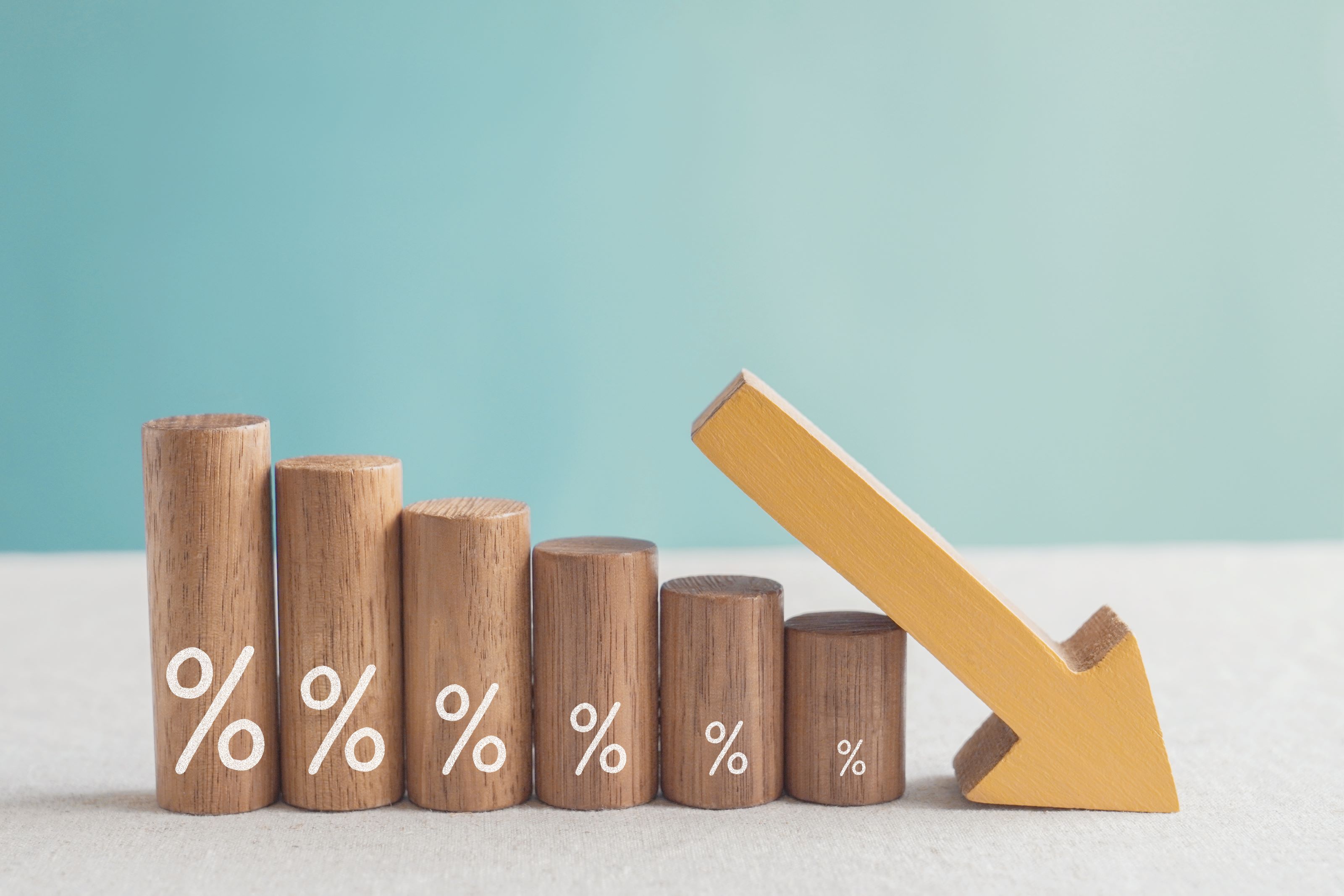Tackle Your Debt Before Retirement
You should aim to leave the workforce with as little debt as possible. Otherwise, money that could be spent enjoying your golden years could end up going to repaying loans.

Profit and prosper with the best of Kiplinger's advice on investing, taxes, retirement, personal finance and much more. Delivered daily. Enter your email in the box and click Sign Me Up.
You are now subscribed
Your newsletter sign-up was successful
Want to add more newsletters?

Delivered daily
Kiplinger Today
Profit and prosper with the best of Kiplinger's advice on investing, taxes, retirement, personal finance and much more delivered daily. Smart money moves start here.

Sent five days a week
Kiplinger A Step Ahead
Get practical help to make better financial decisions in your everyday life, from spending to savings on top deals.

Delivered daily
Kiplinger Closing Bell
Get today's biggest financial and investing headlines delivered to your inbox every day the U.S. stock market is open.

Sent twice a week
Kiplinger Adviser Intel
Financial pros across the country share best practices and fresh tactics to preserve and grow your wealth.

Delivered weekly
Kiplinger Tax Tips
Trim your federal and state tax bills with practical tax-planning and tax-cutting strategies.

Sent twice a week
Kiplinger Retirement Tips
Your twice-a-week guide to planning and enjoying a financially secure and richly rewarding retirement

Sent bimonthly.
Kiplinger Adviser Angle
Insights for advisers, wealth managers and other financial professionals.

Sent twice a week
Kiplinger Investing Weekly
Your twice-a-week roundup of promising stocks, funds, companies and industries you should consider, ones you should avoid, and why.

Sent weekly for six weeks
Kiplinger Invest for Retirement
Your step-by-step six-part series on how to invest for retirement, from devising a successful strategy to exactly which investments to choose.
The debt just crept up on Kathy Lee, 59, and her husband over time. The couple made some home improvements thinking it would boost Lee's in-home day care business. Then there were the costs of an international adoption that never happened. In all, the Lees racked up about $72,000 in credit card debt and a car loan on top of their $582,000-plus mortgage. "We had so much debt," says Lee, a social worker for seniors in Northern California. "It's so hard to get out of it."
Then one day Lee heard personal finance guru Dave Ramsey on the radio extolling the value of getting and staying out of debt. She became a regular program listener and began reading personal finance blogs. After attending a local Ramsey seminar, the Lees sold possessions they no longer needed and worked part-time jobs for extra cash. They also stopped using credit cards. In more than a year, they paid off roughly $44,000 in consumer debt.
The 2008 financial crisis ended their progress abruptly. Lee's husband, who worked in commercial construction, struggled to find employment. Meanwhile, parents who had lost their jobs withdrew their kids from Lee's day care. She was forced to close the business and find other work. Eventually, the couple filed for bankruptcy.
Today, about a decade after declaring bankruptcy, the couple lives debt-free, and they remain committed to the fundamentals they learned while paying down debt. "Now we have more peace of mind," Lee says. "We don't have to worry about debt collectors."
Adults today are nearing and entering retirement with more debt than previous generations. Americans ages 50 to 59 had $3.39 trillion in debt in 2021's first quarter, twice as much as 20 years ago after adjusting for inflation, according to data from the New York Fed Consumer Credit Panel and Equifax. For people 60 and older, it was $3.58 trillion, more than three times as high after inflation compared to first quarter 2001.
Much of that is mortgage debt. The number of adults carrying a mortgage in retirement has doubled in the last 20 years, says Caezilia Loibl, a professor of consumer sciences at Ohio State University in Columbus. Mortgage debt in retirement is tied to increased food insecurity and trouble paying for medications. "Being able to borrow against the equity in your home can be important later in life," she says, because it "eases other financial burdens for an older couple."
"Debt is kind of evil when you go into retirement," says Mike Riffel, private wealth manager at Lucco Financial Partners in Highland, Ill. "You are stuck with a guaranteed payment you have to make when the focus in retirement should be to minimize your expenses. That is something that will haunt you until it's repaid."
And the strategies for taming that debt don't get any easier late in life.

How Much Debt Is Too Much?
You'll need to decide if your debt is manageable -- preferably before you retire. One gauge is your debt-to-income ratio, which measures how much of your monthly gross income goes to debt payments, says Jonathan Howard, a financial planner at SeaCure Advisors in Lexington, Ky. To calculate, divide your monthly debt payments by your monthly pretax income -- retirees should include pensions and Social Security benefits. The lower this number the better, though a ratio under 15% is healthy, Howard says. Banks frequently use this ratio to determine creditworthiness and often won't consider borrowers with a ratio over 43%.
The debt-to-income ratio is also used in another gauge, the 28/36 rule. With this ratio, no more than 28% of your monthly gross income should be spent on housing, including rent or a mortgage, insurance and taxes, says Jay Guyer, a senior financial planner at Janney Montgomery Scott in Philadelphia. Your total debt-to-income ratio shouldn't exceed 36%.
You should also estimate your total expenses in retirement and practice living on that amount while you are still working, recommends Mike Sullivan, director of education at Take Charge America, a nonprofit credit counseling agency in Phoenix. If you struggle to do this while carrying debt, you'll need to develop a repayment plan. Having one in place before you turn 55 gives you time to make adjustments, including paying off more debt or even delaying retirement. "You will earn more at the job you have now than the job you will be forced to take if you realize later you don't have enough to live on," he says.

Lower Your Interest Rates
You'll pay off debt faster by lowering the interest. If you own your home, refinancing the mortgage can reduce the interest rate and the monthly payment. The savings can be used to pay off higher-rate debt like credit cards. Don't refinance your home unless you can lower the interest rate by at least three-quarters of a percent, Riffel says. Also, avoid lengthening the term of your loan, says Paul Humphrey, founder of Humphrey Financial in Forest Lake, Minn. Lenders used to charge more for originating mortgages with an unusual term, like 22 years instead of 30, but now they are more open to it, he says. If you have a nonstandard number of years left on a mortgage, ask your bank to refinance it for that period. "I hate to see a 50-year-old take out a 30-year mortgage," he says.
If that's not possible, pay more than the required monthly amount to eliminate the mortgage sooner. (Just make sure the lender won't penalize you for prepaying the mortgage.) Although this strategy can leave you with less cash to repay other debt, the total cost of your mortgage is reduced in the long run.
Homeowners who are at least 62 years old may be eligible for a reverse mortgage, which eliminates the monthly mortgage payments while freeing up a large portion of the home's equity as cash to pay off other debt. In exchange, you or your estate repays the principal plus accrued interest when you move out or die.
A reverse mortgage isn't recommended for everyone. Although you remain the owner and retain the title to your home, repayment is triggered if you stop living there for 12 months, no matter the reason. "If you could guarantee that you will stay in that home for 20 years and then die in your sleep, that would be ideal, but that is also unlikely," says Todd Christensen, education manager at Money Fit, a nonprofit credit counseling agency in Bohemia, N.Y.
Double-digit annual percentage rates on high credit card debt can demolish retirement savings. Transferring the balance to a new card with a low or zero introductory interest rate reduces the cost of the debt. "If you are not able to pay it off rapidly, at least you can find a more competitive rate," says Bruce McClary, senior vice president of communications at the National Foundation for Credit Counseling in Washington, D.C.
This tactic comes with a few caveats. Some card issuers charge a balance transfer fee, usually about 3% to 5% of the amount transferred. Also, that 0% APR typically expires after a set number of months, and there could be an annual card fee. Before transferring a balance, check these fees and look for a card without them. Transferring an existing balance to a new card won't help you if you continue to use the old one, so either cancel or stop using it.
These options aren't always possible. Lenders can still reject your application for new credit because of a poor credit score or high debt-to-income ratio.

Use the Avalanche Method to Repay Debt
Taming debt doesn't always involve refinancing, and despite their names, these next two strategies won't leave you out in the cold. Under the "snowball" method, you attack your smallest debt first, regardless of interest rate, while paying the minimums on all other balances. Once the smallest debt is paid off, put the extra cash toward repaying the next smallest debt. Lee, who used the snowball method to pay off her debt, says it "gives you a sense of winning, that you are making progress."
The "avalanche" method resembles the snowball strategy except that you target the debt with the highest interest rate first, regardless of the amount owed. In the long run, though, using the snowball strategy to pay off all your debt will cost you more and take longer, Christensen says. He recommends that if you need the quick win from the snowball method, start with that strategy and then switch to the avalanche method after eliminating one or two balances.
If you have medical debt, experts say you should never pay those bills using a credit card. Instead, contact the provider and discuss repayment options. Most medical providers are open to working out a repayment plan, often with little or no interest. "A lot of people may hesitate to do this because they are afraid their request will be rejected or will accelerate sending them to a debt collector, but this actually improves your chances of avoiding that," McClary says.

Seek Out Credit Counseling
If you can't make any headway repaying the debt, get professional help from a nonprofit credit counseling agency. Counselors charge a startup fee, usually about $20 to $40, and then a monthly fee, ranging from $20 to $30, for a debt management plan; by law, the charges are capped in all 50 states. Budgeting plans are free.
Once you sign on to a debt management plan, the agency works with your lenders to waive fees and lower interest rates on unsecured debt, such as credit cards and medical bills, with the goal of repayment in two to five years. Creditors are often willing to negotiate with a credit counselor because these plans usually require that you repay the principal.
Look for a nonprofit credit counseling agency affiliated with the National Foundation for Credit Counseling. It requires counselors to meet 18 quality standards, such as accreditation by a third party and debt management plans that are only provided to clients who can repay the money in 60 months. Be wary of for-profit credit counseling agencies, which don't come with NFCC's seal of approval. For-profit counselors often have an incentive to sell the agency's products and services instead of working in the client's best interest.
Credit counseling agencies are not debt settlement companies, which negotiate with your creditors to accept less than what you owe on unsecured debt. Typically, borrowers are told to stop repaying their loans to strengthen the debt settlement firm's bargaining power, but this destroys the consumer's credit score with no guarantee that your debt will be resolved. Linda Jacob, director of education at the nonprofit credit counseling agency Consumer Credit of Des Moines, had a client who paid a debt settlement company more than $2,000 to settle a debt for $367.
Bankruptcy should be a last resort because creditors may be able to seize assets, such as real estate or tax refunds, to settle what you owe. Besides badly damaging your credit, a bankruptcy stays on your credit report for up to a decade.

Be Inspired
No debt repayment plan is complete without considering what caused the debt. Financing strategies are "just a debt shuffle," Christensen says. "I'm rarely a fan of debt shuffles because they don't address the problem, just the symptoms."
Once you create a budget, find like-minded people with similar goals to help you stay on track, says Lee, who now helps others become financially independent with her Baby Boomer Super Saver blog. Her advice: Look for positive and uplifting examples of people who have paid off their debt. Those examples, she says, can inspire you to reform your own financial habits and may even spark ideas for ways to become debt-free.
Profit and prosper with the best of Kiplinger's advice on investing, taxes, retirement, personal finance and much more. Delivered daily. Enter your email in the box and click Sign Me Up.
Jackie Stewart is the senior retirement editor for Kiplinger.com and the senior editor for Kiplinger's Retirement Report.
-
 You Received a Life Insurance Payout. Here's How to Avoid an IRS Audit.
You Received a Life Insurance Payout. Here's How to Avoid an IRS Audit.You received a big check from your loved one's life insurance policy. Will the IRS be expecting a check from you now?
-
 Supreme Court Strikes Down Trump Tariffs: What's Next for Consumers and Retailers?
Supreme Court Strikes Down Trump Tariffs: What's Next for Consumers and Retailers?Tax Law This landmark decision will reshape U.S. trade policy and could define the outer boundaries of presidential economic power for years to come.
-
 Before You Go to Costco, Try This Grocery Strategy First
Before You Go to Costco, Try This Grocery Strategy FirstA simple shift in how you plan meals could help you spend and waste less.
-
 9 Types of Insurance You Probably Don't Need
9 Types of Insurance You Probably Don't NeedFinancial Planning If you're paying for these types of insurance, you might be wasting your money. Here's what you need to know.
-
 Amazon Resale: Where Amazon Prime Returns Become Your Online Bargains
Amazon Resale: Where Amazon Prime Returns Become Your Online BargainsFeature Amazon Resale products may have some imperfections, but that often leads to wildly discounted prices.
-
 457 Plan Contribution Limits for 2026
457 Plan Contribution Limits for 2026Retirement plans There are higher 457 plan contribution limits in 2026. That's good news for state and local government employees.
-
 Medicare Basics: 12 Things You Need to Know
Medicare Basics: 12 Things You Need to KnowMedicare There's Medicare Part A, Part B, Part D, Medigap plans, Medicare Advantage plans and so on. We sort out the confusion about signing up for Medicare — and much more.
-
 The Seven Worst Assets to Leave Your Kids or Grandkids
The Seven Worst Assets to Leave Your Kids or Grandkidsinheritance Leaving these assets to your loved ones may be more trouble than it’s worth. Here's how to avoid adding to their grief after you're gone.
-
 SEP IRA Contribution Limits for 2026
SEP IRA Contribution Limits for 2026SEP IRA A good option for small business owners, SEP IRAs allow individual annual contributions of as much as $70,000 in 2025, and up to $72,000 in 2026.
-
 Roth IRA Contribution Limits for 2026
Roth IRA Contribution Limits for 2026Roth IRAs Roth IRAs allow you to save for retirement with after-tax dollars while you're working, and then withdraw those contributions and earnings tax-free when you retire. Here's a look at 2026 limits and income-based phaseouts.
-
 SIMPLE IRA Contribution Limits for 2026
SIMPLE IRA Contribution Limits for 2026simple IRA For 2026, the SIMPLE IRA contribution limit rises to $17,000, with a $4,000 catch-up for those 50 and over, totaling $21,000.
